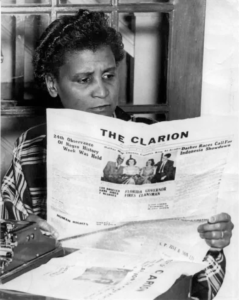Cover photo courtesy of Berma Marshall.
Dr. Carrie Best (DCL’92), born in New Glasgow, N.S. in 1903, was said to have written her first poem when she was just four. She grew up to become a prolific writer, publisher and broadcaster, and was unafraid to call out the racial injustices she witnessed in her lifetime.
“I fought on my own terms and with my own weapons…Intelligence, patience, a lot of prayer, a lot of forgiveness,” Dr. Best says in a CBC interview in 1991.

Photo courtesy of Berma Marshall.
In 1943, Dr. Best confronted racial segregation at the Roseland Theatre in New Glasgow. She had purchased two tickets for downstairs seats to watch a movie with her son. Both of them were arrested and fought the charges to challenge the legality of the theatre’s segregation. Their case was unsuccessful and they were ordered to pay damages to the Roseland’s owners. The experience motivated Dr. Best in 1946 to found The Clarion, a newspaper that exposed racism and explored the lives of Black Nova Scotians. Among her first big stories at The Clarion was the case against Viola Desmond, the Halifax beautician similarly arrested, charged and fined for sitting in the whites-only seats at the Roseland Theatre.
Skip ahead seven decades…
Seventy years later, in 2016, a high school senior named Eddie Cuevas was at home in Oakville, Ont., contemplating which university to attend. With high marks, strong references and a resumé that cited his involvement in music, football, theatre and student senate, he was populating a large spreadsheet listing all his university options and scholarship opportunities. They included King’s and its $5,000 Carrie Best Scholarship.

First year student Eddie Cuevas.
“I researched her (Carrie Best) and found out she was a journalist…To see a black woman standing up was inspiring. It was a sign you can overcome things. Obstacles are made to be jumped over,” says Cuevas. He won the scholarship, which is open to Black Canadian and Indigenous Canadian students and renewable for up to four years, and he’s now enrolled in the Foundation Year Program.
“I got a letter in early February telling me I’d won. I freaked out. The letter is still on my fridge. It was a very proud moment,” says Cuevas.
Cuevas says he never thought he’d enjoy writing a paper at three in the morning, but he’s discovered the pleasure in doing so this semester. “I’m lucky and glad it turned out this way,” he says. He was also recently elected to the equity committee of the King’s Student Union.
Dr. Best had a similar work ethic. “We’ve got to work twice as hard. We’ve got to be twice as honest,” she told the CBC’s Jim Nunn.
Dr. Best’s newspaper lasted for 10 years. Her son, Dr. James Calbert Best (BA’48, DCL’95), was co-founder of The Clarion and later became a Canadian diplomat.
In 1954, Dr. Best also began her own radio show, The Quiet Corner, which aired on CBC Radio out of Halifax. It was a program of poetry and music that ran for 12 years. Then from 1968 to 1985 she wrote a column about human rights for the Pictou Advocate. She also wrote her autobiography titled The Lonesome Road which was published in 1977.
On coming to King’s
Cuevas had never been to Halifax until he arrived at King’s on move-in day, and already he’s reflective, recognizing it was a bold move, but one he’s happy he made. He says he’s rediscovered his passion for theatre, has joined the King’s Theatrical Society and will perform in Mr. Burns, A Post-Electric Play from Nov. 29 to Dec. 2. He’s also performing at open mic nights around the city.
Sylvia Hamilton, a filmmaker and journalism professor at King’s who knew Dr. Best as a community leader and fellow church-goer, says Dr. Best also commanded attention from behind a microphone. When she received her honorary doctorate from King’s, she gave her acceptance speech in the form of a poem.
“The students were very taken with her,” says Hamilton, but the poetry recitation shocked Dr. Best’s daughter who was at Encaenia and didn’t know this was her mother’s intention.
“She (Dr. Best) was the kind of person you couldn’t say no to,” says Hamilton, who is currently working on a series of documentaries about Dr. Best that will be shown at the Black Loyalist Heritage Centre in Birchtown, N.S. “She was one of those individuals who had an incredible presence.”
During her lifetime, Dr. Best was granted many awards and distinctions for her work in furthering race relations, including member of the Order of Canada in 1974 and a Harry Jerome Award in 1986. She was posthumously awarded the Order of Nova Scotia in 2002 and in 2011, was commemorated on a Canada Post postage stamp. Dr. Best died at the age of 98 of natural causes in her hometown New Glasgow.
Her legacy lives on at King’s through students like Cuevas.
“I wouldn’t be here (at King’s) if it wasn’t for the Carrie Best Scholarship. It’s opened up a lot for me. It’s the reason I don’t have to have a job this semester. It’s been the most help, financially and with peace of mind, knowing it’s going to be OK,” said Cuervas.
Applications for the Carrie Best Scholarship are due Jan. 15.

